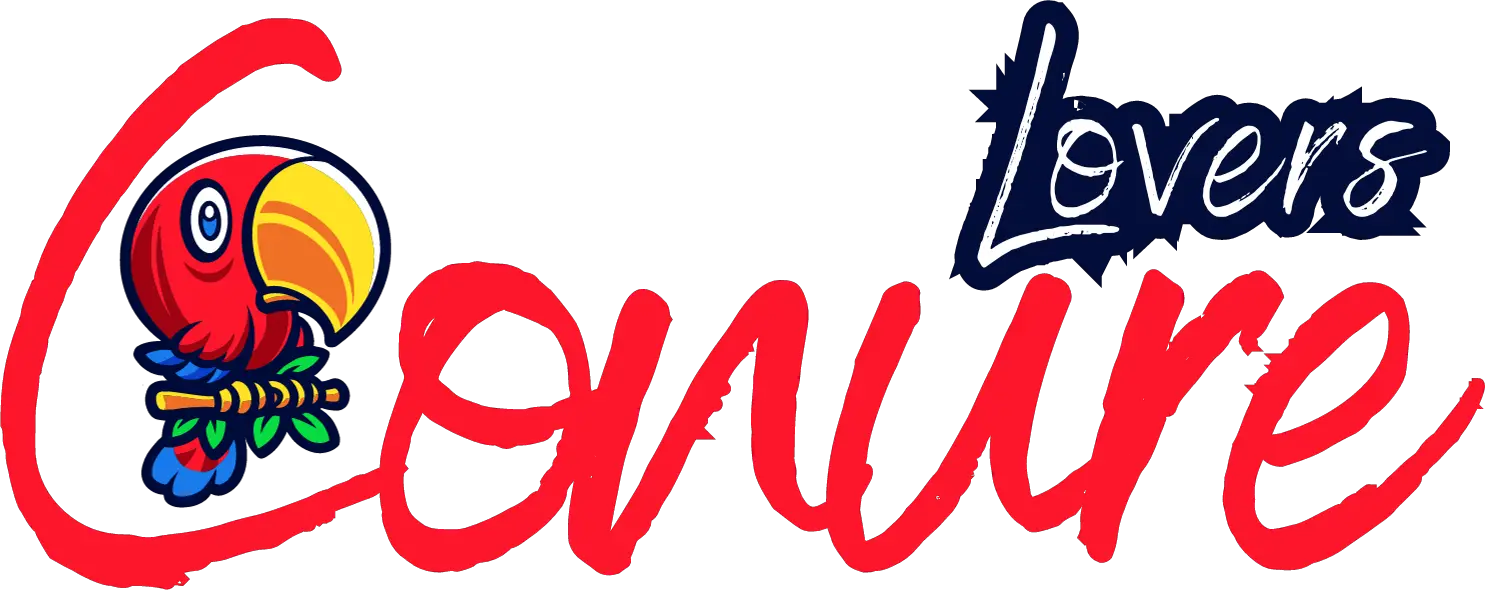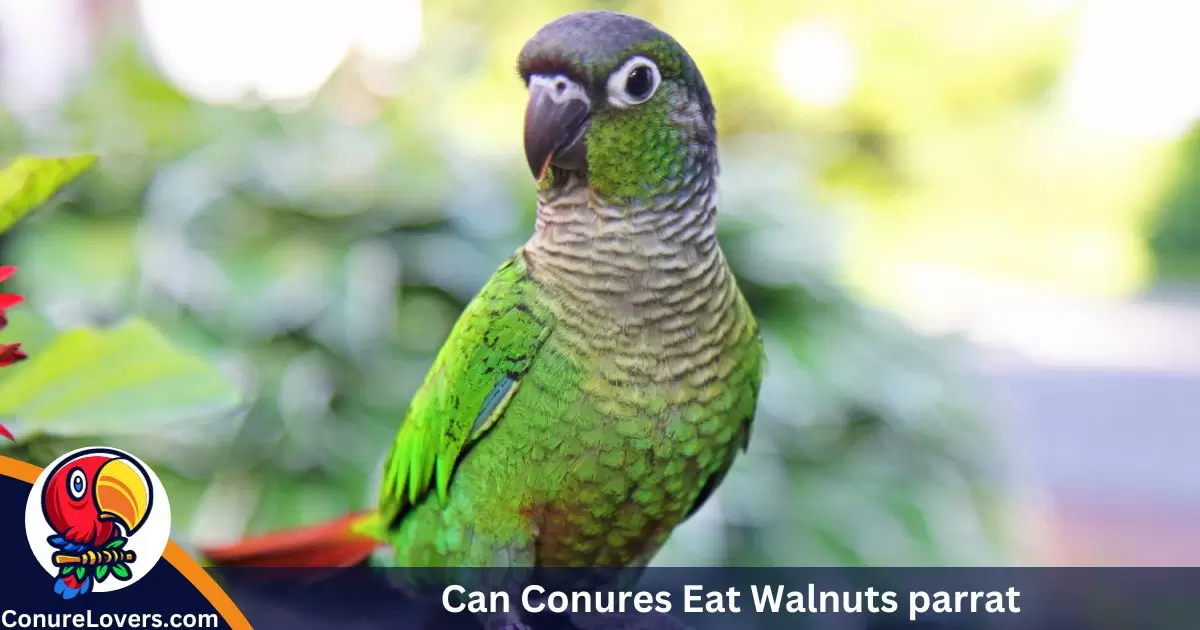Can conures eat walnuts? YES, They require a diet with higher fat content, which can come from nuts such as almonds, Brazil nuts, coconut, cashews, and walnuts.
Ensure that these nuts are without coatings, salt, or oils. Mix these nutritious nuts with fresh foods, tiny pasta, rice, whole grain bread, or toast.
It’s important to be creative in offering a variety of foods, especially if your bird is a bit stubborn.
Navigating the Avian Menu:
Our colorful companions thrive on a balanced diet rich in essential nutrients. While exploring the vast array of foods suitable for conures, the spotlight turns to the enigmatic walnut. Known for its nutritional prowess in the human world, we delve into whether this nutrient-packed nut is a safe and beneficial addition to our feathered friends’ menu.
Unlocking the Nutritional Potential:
Join us as we unravel the nutritional secrets hidden within walnuts. From omega-3 fatty acids to vitamins and minerals, we’ll examine how these elements contribute to the overall health of our beloved conures. Are walnuts a superfood for your feathered companions? Let’s find out!
Caution on the Horizon:
However, our journey comes with cautionary road signs. Not all that glitters is gold, and not every nut is suitable for our avian buddies. We’ll explore the potential risks associated with feeding walnuts to conures, keeping a watchful eye on their well-being. So, fasten your seatbelt, bird enthusiasts – our exploration begins with the crunchy query of walnuts in a conure’s diet!
Walnuts: A Nutritional Breakdown
Cracking the shell of mystery surrounding walnuts, we delve into the nutritional breakdown of these small, brain-shaped wonders. Are they a treasure trove of health benefits for our conure companions, or do they harbor potential risks?
The Nutrient Symphony: Walnuts boast an impressive nutrient profile. They are rich in omega-3 fatty acids, essential for heart health, and pack a punch with vitamins and minerals. These elements contribute to a glossy plumage, strong bones, and overall vitality in conures.
The Power of Omega-3s: Omega-3 fatty acids are like the superhero defenders in the avian world. They support cognitive function, reduce inflammation, and contribute to feather perfection. In the human diet, walnuts are celebrated for these benefits, but does the same hold true for our feathered friends?
Navigating the Risks: As we tread further, caution flags are raised. While walnuts offer nutritional gems, they come with risks. The high-fat content could potentially lead to weight issues, and the size may pose a choking hazard. It’s imperative to proceed with careful consideration and mindfulness about our conure’s unique dietary requirements.
Expert Opinions and Research Findings
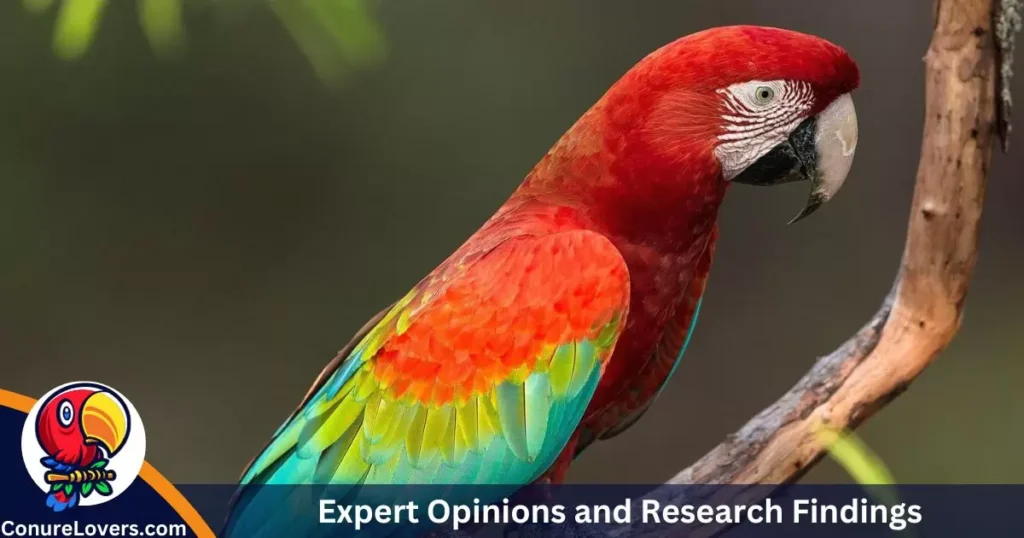
In our quest for avian wisdom, we turn to the experts – avian veterinarians and bird nutrition specialists. What do these guardians of our feathered friends have to say about introducing walnuts to a conure’s diet? Let’s seek their guidance and merge it with the insights from scientific research.
The Avian Expert’s Verdict:
Avian veterinarians emphasize the importance of moderation and caution. While acknowledging the nutritional benefits of walnuts, they highlight the need for careful monitoring. It’s a delicate balancing act, ensuring our conures reap the rewards without falling prey to potential pitfalls.
Read Also: Can Conures Eat Kiwi
Insights from Avian Nutrition Research:
Scientific studies provide a deeper understanding of how specific nutrients impact our avian companions. Research underscores the positive aspects of incorporating omega-3-rich foods into a conure’s diet. However, it also cautions against overindulgence, reinforcing the notion that too much of a good thing may have adverse effects.
Striking a Balance:
The key takeaway? Balance is paramount. While walnuts can be a valuable addition, they should be treated as a supplement rather than a staple. Experts suggest observing your conure’s response to walnut introduction, keeping an eye on weight, behavior, and overall health. It’s a collaborative effort between pet owners and avian specialists to tailor the best diet for our feathered companions.
As we transition to the practical realm of incorporating walnuts into a conure’s diet, remember that knowledge is power. Empower yourself with the guidance of experts and the insights gleaned from research to make informed decisions about your conure’s nutritional journey.
How to Introduce Walnuts into Your Conure’s Diet
The moment of truth has arrived – you’ve decided to introduce walnuts to your conure’s culinary repertoire. But how do you go about it without causing a flap? Let’s dive into the practicalities of incorporating walnuts into your feathered friend’s diet.
Gradual Introduction Guidelines:
Just like any new food, walnuts should be introduced gradually. Start with small, finely chopped pieces to gauge your conure’s response. Monitor for any signs of digestive discomfort, and if all is well, you can gradually increase the quantity over time. Patience is the key to a successful introduction.
Creative Culinary Ventures:
Spice up your conure’s mealtime by incorporating walnuts into their favorite dishes. Mix them with pellets, fruits, or vegetables for a delightful medley of textures and flavors. The goal is to make the introduction enjoyable and exciting for your feathered companion. 🎉
Observing Acceptance or Rejection:
Pay close attention to your conure’s reactions. Do they eagerly munch on the walnuts, or is there hesitation? Birds, like humans, have individual preferences. Some may embrace the new addition with gusto, while others may take time to warm up. The key is to respect their pace and preferences. 👂
As we embark on this culinary adventure with our conures, it’s essential to remember that every bird is unique. What works for one may not work for another. In the upcoming section, we’ll explore alternatives to walnuts, ensuring a diverse and well-rounded diet for our feathered friends.
Alternatives to Walnuts
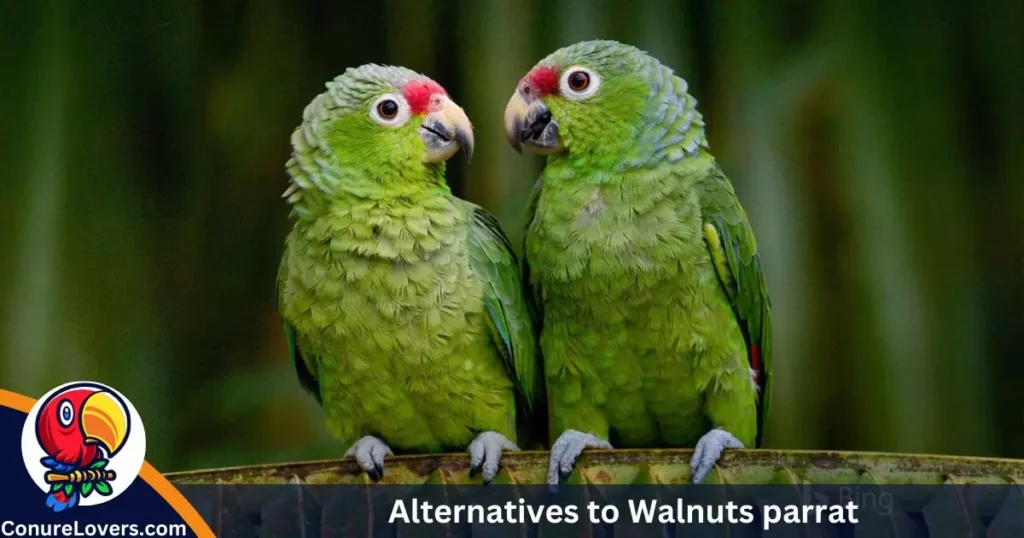
As we tread the path of responsible pet ownership, it’s essential to acknowledge that variety is the spice of life – especially in a conure’s diet. If walnuts present challenges or if you seek diverse options, fear not! Let’s explore alternative nuts and seeds that can add both nutritional value and excitement to your conure’s meals.
Bird-Friendly Nuts and Seeds:
While walnuts have their merits, other nuts and seeds offer a spectrum of nutrients. Almonds, pine nuts, and pumpkin seeds are excellent alternatives. Rich in vitamins, minerals, and healthy fats, they provide a delightful array of flavors and textures. Remember to introduce them gradually, just like you would with walnuts.
Fruits: Nature’s Sweet Treats:
Expand your conure’s palate with a rainbow of fruits. Blueberries, strawberries, and apple slices are not only tasty but also packed with vitamins. These natural delights bring a burst of flavor and nutrition to your feathered friend’s diet. Slice them into bite-sized pieces for a fun and nutritious treat.
Veggies for Variety:
Don’t forget the veggies! Broccoli, carrots, and bell peppers offer essential vitamins and minerals. They also provide the necessary crunch for your conure’s beak and promote dental health. Experiment with different vegetables to discover your bird’s favorites. Remember, a colorful plate often translates to a nutritious one.
Balancing Act:
The key to a well-rounded diet is balance. Mix and match various nuts, seeds, fruits, and vegetables to ensure your conure receives a diverse range of nutrients. It’s like curating a culinary adventure for your feathered companion, keeping mealtime exciting and wholesome.
As we round up our exploration of dietary alternatives, it’s crucial to embrace the individuality of each conure. Pay attention to their preferences, monitor their health, and consult with avian specialists if needed. In the final sections, we’ll delve into personal experiences and testimonials, offering a glimpse into the real-world adventures of conure owners.
Personal Experiences and Testimonials
Embarking on the journey of conure ownership is a personalized adventure, filled with joy, challenges, and discoveries. Let’s hear from fellow conure enthusiasts who have navigated the realm of introducing new foods to their feathered companions. These real-world experiences provide valuable insights and a touch of authenticity to our exploration. 🐦💬
Jenny’s Journey with Walnuts:
Jenny, a devoted conure owner, shares her experience introducing walnuts to her feathery friend. “At first, there was a bit of hesitation, but eventually, my conure, Kiwi, embraced walnuts with enthusiasm. It became a favorite snack during our bonding sessions. Moderation is key, and watching Kiwi enjoy this treat brings me immense joy.”
Father-Son Bonding with Nuts:
David, a proud father of a conure named Mango, reflects on their journey. “We experimented with different nuts, and Mango’s absolute favorite is almonds. We use them as a bonding tool during training sessions. It’s fascinating how these small treats create a stronger bond between us.”
Community Insights:
Bird owner communities are treasure troves of shared experiences. From funny anecdotes to valuable advice, these forums provide a supportive space for conure enthusiasts. Engage with these communities to learn from others, share your experiences, and gather a wealth of knowledge.
In our concluding sections, we’ll summarize the key takeaways, offer additional resources for ongoing learning, and encourage responsible exploration in your conure’s dietary journey. Stay tuned for the grand finale of our avian culinary exploration!
Our adventure into understanding what our conure pals can munch on has been like a bright and colorful trip, just like their pretty feathers. We checked out if walnuts could be a good snack and explored other yummy options, making sure we keep our feathery buddies healthy and happy. It’s like finding the right mix of treats for a conure to be at its best.
Main Lessons:
– Walnuts can be good but not too much – gotta be careful!
– There are lots of tasty choices like almonds, pine nuts, and yummy fruits and veggies.
– Every conure is different, so we need to watch and see what they like.
Keep Learning and Trying New Things:
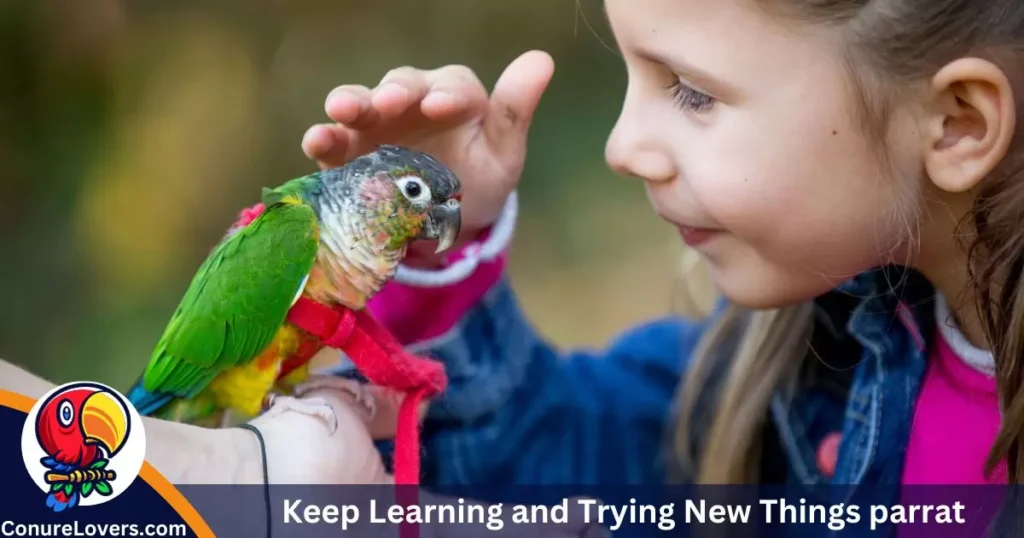
Being a good bird buddy means we keep learning about bird food, talk to other bird pals, and ask bird doctors for help. The more we know, the better we can take care of our little feathered friends.
Exciting Times Ahead:
So, as we finish up our food adventure, remember that taking care of our conure buddies is like creating a special menu just for them. It’s a bit of love, a bit of knowledge, and a lot of fun in this colorful journey of being the best friend to our birdies!

I’m Justin Taylor, your Conure Buddy Guide from “Conure Lovers.” Join me on a journey to discover simple and joyful ways to care for your feathered companion. Let’s make each day with your conure special!
